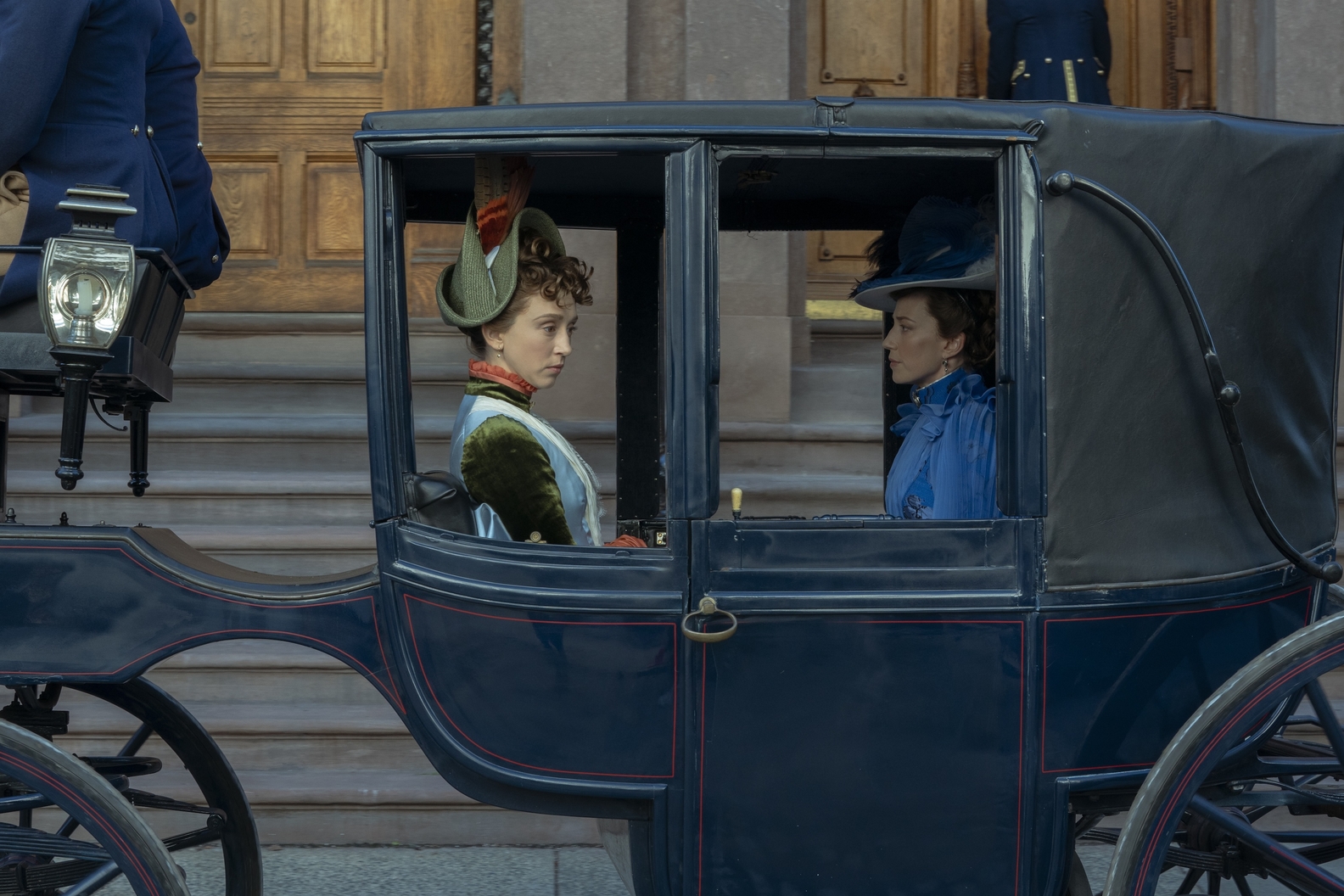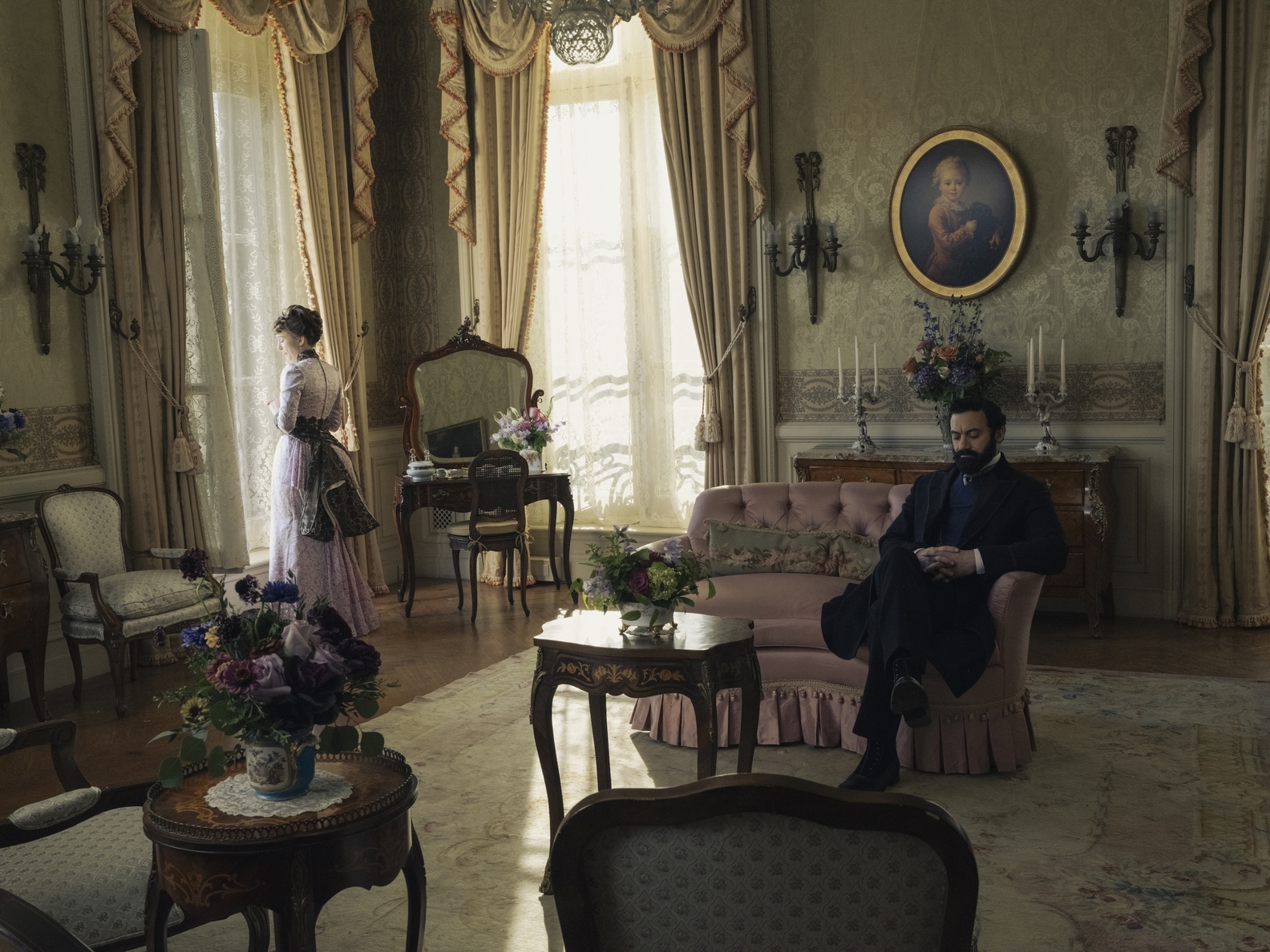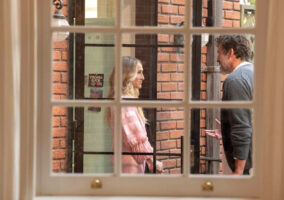
Picking up directly from where we left off, Adelheid runs frantically through a bunch of rooms we didn’t recognize looking for Gladys and it occurs to us that, aside from the grand staircase, the dining room and one or two salons, the Russell household isn’t particularly well represented onscreen. When we think of Downton Abbey, we can picture about two dozen rooms, some of them bedrooms. But the Russell house feels almost generic, which could have something to do with the fact that it’s largely a set, with several rooms sourced in various real-world locations, unlike Highclere Castle, the single location where DA was partially filmed. Similarly, the Van Rhijn house, while not as big as the Russell manse, is pretty damn huge but you’d never know it because 90% of the scenes take place in the same room. Anyway, the servants send Larry up to Bertha’s room to tell her that her daughter has tied her sheets together or shimmied down the drain pipe or whatever. We’re enjoying the rapport between mother and son this season — or rather, the lack of it. You have to figure Bertha was no more than a teenager when she had him and, because of the gender expectations of the day, she’s in far less position to control him than she is her daughter. She’ll pull rank as his mother and she gets her way, but there’s a surprisingly egalitarian undertone to their relationship now. He remains the only person in the house who’s truly capable of confronting her and even occasionally putting her on the back foot. He never gets his way in the long run, but he’s turning into a formidable antagonist for the unstoppable Bertha.
“I hesitate to pull rank, but my great-grandfather signed the Declaration of Independence” is a motherfucking banger of a line, but Mrs. Carlton is not a match for Bertha Russell, who flies in on her broom, gives every Carlton in the room the back of her hand, and scoops Gladys up to take her home. So much for her elopement.
The Scotts come to the Van Rhijn house and bicker over which entrance they’re supposed to use. This is such a thin needle to thread in order to allow the Scotts agency and a voice in a setting that historically would have violently denied them both. Much as he did with the Crawleys of Downton Abbey, who rather ludicrously welcomed an illegitimate grandchild, an Irish revolutionary and a psychotic openly gay butler in their household circa 1920, Julian Fellowes is granting Agnes a largesse that sets her extremely far apart from her social class. He was always a big proponent of the idea that manners and good breeding were tools to make everyone in society more comfortable, and so Agnes welcomes a Black family into her front parlor and gives a speech about manners. To be fair, it’s clear the sisters came from a family of abolitionists with a history of charitable work toward Black Americans.
Unlike the Crawleys, however, Agnes does come in for some discomfort in the conversation, as her lack of action on their daughter’s well-being is worth calling out. More pointedly, Arthur eventually tells her, “I’m not sure good manners will be an effective cure for two and a half centuries of slavery.” He rightly calls Agnes out for her naïveté, for thinking righteousness could overcome racism and save his daughter’s life. She squirms under his questions, but she admits the truth of all of them. These were good and necessary scenes that pointed out the limits of Agnes’s benevolence while allowing the Scotts the time to make some points.
Downstairs, Fellowes once again puts the less acceptable culture-wide attitudes of the period into the mouth of one downstairs maid; the villain of the piece, of course. All of the other servants tell her to shut up. There is perhaps a nice version of history in which the working immigrant class of Gilded Age New York felt some sort of social solidarity with Black people, but it might have behooved Fellowes and co-writer Sonja Warfield to allow more of the downstairs staff the space to be, if nothing else, unsettled by the matter. Black people being entertained by the mistress in the front parlor would have been an entirely unheard-of thing for them. Notably – and bitingly, if you’re paying attention – Agnes didn’t offer the Scotts a thing to eat or drink and the servants were largely kept clear of the room while they were in it. In related news, while this storyline made some good points about the racial realities of the world, we predicted that it was probably a setup to introduce Peggy’s next beau and it looks like we were right. He’s formal and speaks very precisely and he’s clearly head over heels already.

Hot Beard comes home (rather quickly) from Arizona and immediately entertains JP Morgan. They smoke cigars through their prodigious facial hair and talk about money and world-changing empires, as men of their class are prone to do. Morgan promises to “do what I can,” which is always the level of detail in any of the business conversations Fellowes scripts. Later George walks in on his entire family screaming at each other and as we said in last week’s recap, we’re loving how completely fucked up this foursome is. It is, perhaps, one of Fellowes’ usual quirks to make the wealthy family with no breeding into a bunch of angry, scheming yellers, while the old money matriarch across the street is showing herself to be gracious and forward-thinking.
Gladys pleads with her father to protect her and he tells them all to calm down. He’s out of his depth on this one. Bertha tells him she’s building Gladys a golden life, where their grandchildren will be considered among the most powerful in the world. Hot Beard makes a few weak pleas, but he really isn’t a match for her, although he definitely seems cool on her at the moment. He tells Gladys that her mother is trying to give her a life of power and influence, but she continues to argue for the insipid Billy Carlton. Hot Beard promises to “hear his arguments” at Aurora’s party. Meanwhile, the downstairs staff is abuzz as the impending engagement is being teased in the papers. The not-French chef’s bad news is that his wife is dead. He tries unsuccessfully to appear saddened by it.
Aurora reminds her completely (and literally) checked-out husband that they’re hosting the Young Women’s Christian Association benefit. He makes it clear that the marriage is over and that she needs to accept it. “I’m to accept the end of my world, with the sky crashing down in flames?” she weeps melodramatically. We fear Mrs. Fane is spiraling precipitously. She manages to pull herself together to visit the Van Rhijn house, where Ada is completely out of control, trying to get everyone around her to sign a temperance pledge and ignoring just how invasive she’s being. She convenes the entire staff — “My staff” as she points out to Agnes — to sign a temperance pledge. The staff is rightly annoyed by this encroachment on their time off. The sisters bicker over this until Bannister loses his cool and demands to know who the servants are answerable to. For some reason, Aurora is allowed to settle the matter. “Mrs. Forte is the head of the household now.” We see no reason why Agnes should accept that, especially since it’s coming from someone who is quickly losing her social standing. In response to Aurora stepping into her household business, Agnes let’s slip that it would be better for the increasingly unhinged Aurora if her husband were dead.
Outside, Larry and Marian are sneaking off into empty carriages to make out. Larry takes Jack for a new suit ahead of their meeting and Fellowes makes sure to point out that Jack has tacky tastes. “We’re after understated elegance,” Larry condescendingly instructs him. Later, Marian reveals to Ada that Larry is in love with her and that she’s scared to move forward because of her slutty past. Ada agrees that Marian was kind of a slut and suggests she try signing a temperance pledge.
Aurora’s party is a disaster and her husband is a dawg. Charles Fane shows up with his side piece, an act so reckless and shocking in this setting that we’re starting to think he might really wind up dead soon. We get that the upper classes divorced during this time (which is probably why Fellowes inserts Charlotte Astor into the scene, flirting with the man who will one day end her marriage) and that men typically fared better than women in these situations, but Charles would have to be nuts to think he could parade his mistress around at a Christian Women benefit in front of Mrs. Astor. She, for her part, is titillated at the prospect of destroying someone’s life (“Will you be spending more time in Newport?”) but tries not to show it.
Mrs. Carlton appeals to Bertha to reconsider and in response, Bertha slashes her throat in full view of the other party-goers. Okay, no. She merely told her that she would disinherit her own daughter and destroy Mrs. Carlton’s son. Mrs. Carlton is revolted and asks her what kind of a person she is, foolishly handing her the opportunity to land one more bitchslap. “As a rule, I’m the sort of person who gets what she wants.” Mrs. Carlton finds Mrs. Russell too uncouth to bother with after their confrontation. Billy Carlton is a wimp and he’s so overwhelmed by Hot Beard’s capitalist manliness that he runs into the night, crying like a little girl at the sight of him, and his mother assures him that he escaped a terrible fate. “What a ghastly gathering,” she rightly notes as they leave.
Inside the ghastly gathering, John Adams digs Oscar out of his misery and tells him he’d do anything for him while Hot Beard finds out to his surprise that the Duke will be staying at their house. He confronts Bertha later about her manipulations but she’s a brick wall. “George, I don’t expect you to understand this because you’re not a woman but I am trying to empower her.” In the context of the times, Bertha has a point, but in her zeal to convince everyone, she sure is making it sound like her own marriage was a disappointment to her. Despite this, George mostly acquiesces. He may be a titan of business, but he’s no match for her. When he asks her when he’ll be allowed to have a say in their daughter’s life, she has an answer immediately; one she’s clearly thought of many times before: “The day I’m in your boardroom giving you my ideas on the railroads and the steel mills.”
But things in that household are starting to spiral out of control and not even the implacable Bertha Russell is likely to be able to keep all of these plates spinning before a few of them shatter. On the night of the Duke’s arrival, Church informs Larry that Billy Carlton is waiting at the servants entrance, and that’s something that would almost certainly get him fired if Bertha found out. At this point, both of Bertha’s children and the head of her staff are in open revolt against her and her husband is starting to see her in a light he clearly doesn’t like. Gladys asks Billy if he’ll come in and speak to her father and he tells her that he just can’t fight the Russells. Just then, the Duke shows up with his lawyer, George is furious, and as they all sit down for what’s likely to be one horrible dinner, Marian is all “Get me the fuck outta this fam.”
[Photo Credit: Karolina Wojtasik/HBO]
RUPAUL’S DRAG RACE ALL STARS: The Golden Bitchelor Next Post:
Please review our Community Guidelines before posting a comment. Thank you!



